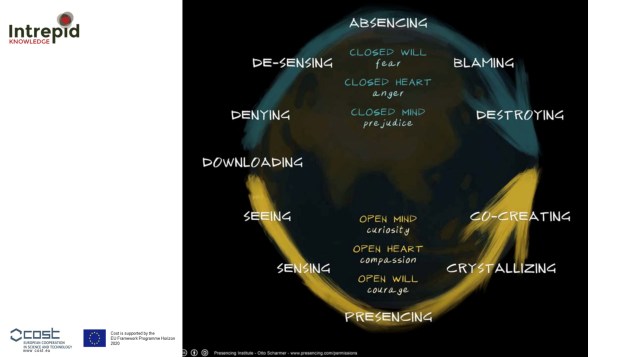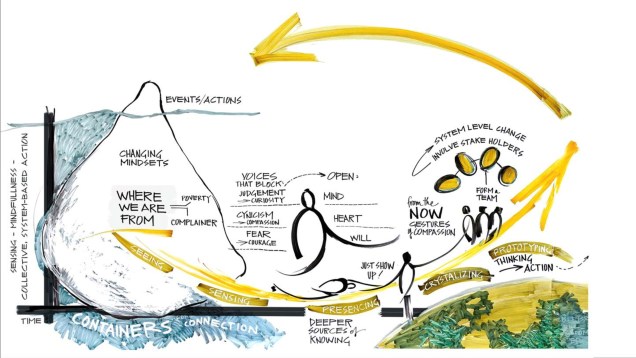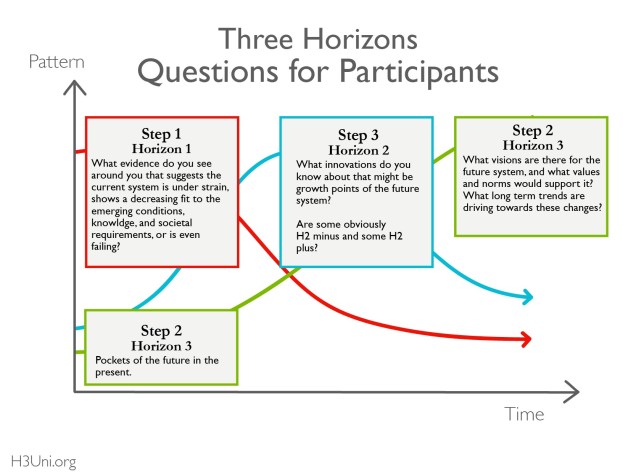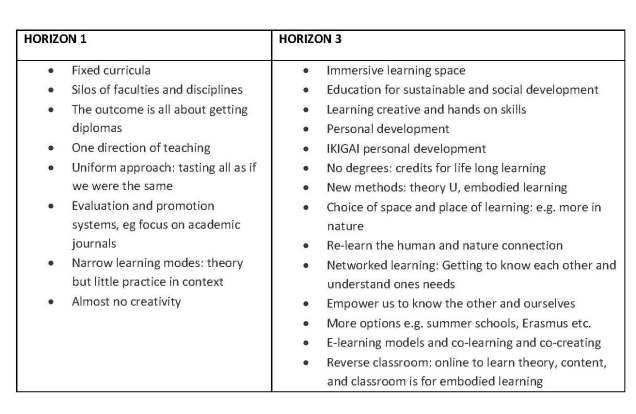By Olivia Bina
U for you
When was the last time you sat with two strangers and told them the story of your life, in three minutes?
Mine was eight weeks ago. It is harder than you think. And not just because of the embarrassment factor, but because one too rarely thinks of one’s whole life, let alone presenting it in three minutes. But it does achieve something precious: it tears down silos. Silos of me and you, of all those ideas of what makes us different, of what divides us, of the ‘what I do’ identities. It leaves you with something simpler, something about a shared humanity and a sense of what probably does matter and what probably does not (at least not that much).
U for University
It is from within this space that thirty-two people from fifteen countries began a journey to explore ‘The Future Of Universities, as if Sustainability Mattered’: a training programme centred around the question of how universities can be a positive force for transformation and change towards a more sustainable future.
The key words here being ‘future’ and ‘sustainability’, since both inevitably require a normative exploration engaging with ‘evaluative claims about what is good’. And to add to the discomfort that at least some of us are already feeling with ‘being normative’, let me introduce the killer application: during a whole week, we were asked to use bodies (the ones in the room), emotions and, yes, minds. That was meant to take care of the centuries-long arguments around separation between thought and feeling.
Why does it matter? Why should we reconcile thought and feeling? Because in designing this week-long journey, coordinated by Marite Guevara, we aimed to develop some sense, and some idea, of a normative, embodied ‘future of universities’. We wanted to respond to the need ‘to fight for a different vision of higher education’ as Noel Castree called it: a vision that does not find itself exploring shades of neoliberal grey. We think that more should be done to repurpose universities and we took heed of Otto Scharmer’s critique: ‘The difficulties we have in meeting today’s global challenges, such as implementing the 17 Sustainable Development Goals (SDGs) worldwide, are not caused by a knowledge gap… The problem is a knowing-doing gap: a disconnect between our collective consciousness and our collective actions’. Our universities are still key institutions where knowledge is disseminated and created, and it is essential that they stop amplifying such gaps and divides through their predominant ‘silo structures’ and resulting mindsets.
I guess it is therefore apt that we were operating within the INTREPID arena: the EU funded network we are coordinating with a view to explore inter and transdisciplinary forms of knowledge needed to understand and engage with 21st century (sustainability) challenges. Details of earlier INTREPID work on this issue are available here: the Lisbon Conference (January 2017); the London’s workshop (March 2017): Universities and Knowledge for Sustainable Urban Futures: as if inter and transdisciplinary mattered, and the Lüneburg’s conference session (September 2017): Thinking about the Future of Universities; and Lavinia Pereira and I have summarized some ideas in a blog last year, while Lavinia describes in-depth an actually existing alternative university here.
Here I wish to share a few reflections about process and content based on our last training school.
U for Theory U and more
The school was designed to explore ways of thinking about futures by combining Theory U and 3 Horizons. An introduction to Theory U by Otto Scharmer and Katrin Kaufer outlines the core ideas and the practice of the ‘U process’, based on a concept they call ‘presencing’: a heightened state of attention that allows individuals and groups to shift the inner place from which they function. When that shift happens, people begin to operate from a future space of possibility that they feel wants to emerge. Being able to facilitate that shift is, according to Scharmer, the essence of leadership today. Isabel Chaparro led the participants through Theory U, which entails travelling along the stages from ‘downloading’ to ´co-creating’, illustrated in Figure 1, and from ‘seeing’ to ‘prototyping’, Figure 2.


The 3 Horizons approach, in this context, provides a complementary set of techniques. Carlo Sessa led this part borrowing from the work of H3Uni. It entails building pathways to a desired future, which for this training school meant envisioning universities where ‘sustainable development mattered’, through the exploration of three horizons (Figure 3).

We combined Theory U with 3 Horizons thus:
- Horizon 1: Downloading past patterns (no more business as usual; seeing, sensing and presencing)
- Horizon 3: Presencing the emerging future (paradigm shift and crystalizing)
- Horizon 2: The innovation we need (crystalizing and prototyping)
Figure 4: Groups shared their visions for Horizon 1 (current situation) and Horizon 3 (long term vision). © Isabel Chaparro and Marite Guevara
The results of each step cannot be easily described in this blog, but you can see some of the results of the three horizons scanning in Table 1, and you can read about the five participants prototypes (part of Horizon 2) here:
Our discussions and the many exercises throughout the week (including storytelling, movement science, art exploration, social presencing theater, stuck exercise, 4D mapping) allowed us to explore our overall theme of how to ensure a long-term contribution of academia to sustainable futures, including the ‘knowing-doing gap: a disconnect between our collective consciousness and our collective actions’ highlighted by Scharmer. The prototypes were especially geared towards this, but in fact the whole Theory U process is designed to bring this tension to the foreground, especially starting from our selves and how we live. The ethos behind Theory U requires us to turn to ourselves first, since, again in Scharmer’s words, the problems outside (including non action) tend to originate from within: “Let no one enter [the university] who cannot see that the issues outside are a mirror of the issues inside“.

U for sustainability, or Utopia
About content, it seemed we made a mistake. We chose Sustainable Development Goals (SDGs) as a starting point to discuss the need for a university that actually contributes to share and create knowledge for sustainable futures. Everyone loved the idea while preparing the workshop. Everyone who signed up was excited about explaining how they already worked towards integrating SDGs in their universities and in communities or institutions outside universities. And then, passed the introduction session, they were gone.
But was it really a mistake? No one remembered them in the language they used. But we all discussed the bits and pieces that make up the core problems and challenges embedded in each of the seventeen goals. We looked at SDGs from the space we had created with our life stories, and that ‘changes everything’. In listening to our participants reflecting on what mattered to them in terms of the nexus of knowledge, higher education and sustainability, Marta Varanda and I had to come up with a core question for a ‘generative conversation’ as part of the Theory U process. It came out to be a three part question: Who do we want to be? What society do we want to live in? What is the role of university (in all this)? The result is partly summarized in Figure 5.
Figure 5: Who do we want to be? What society do we want to live in? What is the role of university (in all this)? © Olivia Bina
Here I would like to reflect on the broader picture, rather than on the specifics of the answers offered. I am particularly interested in the promotion of skills and dispositions to envisage desired futures, or, as my colleague Andy Inch once pointed out to me: in ‘the education of desire’ after Miguel Abensour. Ruth Levitas has painstakingly sought to reconnect us with the essence of utopianism, which she broadly defines as the expression of the desire for a better way of living or of being. She also points to prefigurative practices of utopia as another way of living out ‘the relationships and practices that might characterize an imagined better future’. Our efforts to integrate Theory U and 3 Horizons are an initial exploration of how to educate our desire. For example, Horizon 2 and Prototypes might be seen as a step towards prefigurative practices.
Repurposing Universities: a first step
Consistently with our other INTREPID efforts towards thinking about the future of inter and transdisciplinary knowledge and the role of our universities, participants in this Training School also generally sought for a much clearer purpose. As one participant put it: ‘today we don’t go to university because we want to, but because it is what you have to do to get on in life’. Some of the key words offered in reply to our three-part questions pointed to a fundamental rethinking of the ethos of teaching, learning and doing research.
There are libraries full of wise words about the essential place of wisdom in society, and about the importance and traditional role of universities as places where such wisdom is dissected, questioned, reconfigured and cultivated. All I want to add here is that, today, the pursuit of critical pedagogy has become the only option if we wish to stir clear of assorted dystopian futures, where information replaces wisdom, and where humans might become means to undisclosed ends. By critical pedagogy I mean the ‘spaces where the achievements and maladies of the wider world can be openly examined’, the counterforce that provides students with time and space outside the algorithms that now populate our increasingly virtual world, the pedagogy that recognizes humans as the combined whole of mind, body and soul, the pedagogy that allows for the active struggle over ‘how human beings should live and what our life means’, and empowers -them and us- to envision sustainable prosperous futures. Or, put still more simply, universities must be the place and space where we can still question ‘Whose Utopia’ and the nature and possibilities of our human condition, and continue to reshape multiple ways towards Ruth Levitas’s social and concrete utopias, and prefigurative practices.
U INTREPID People
So we came to the end of the week. The process was everything but polished, and we are sure we need rethink many of the links and steps we took, to make them work better. But no one wanted to leave. Some just hung around for four hours after we said goodbye, until we were all thrown out by security. So, I guess we must have done something right.
My most sincere thanks to the organising team – Marite GUEVARA (Ersilia Foundation, Barcelona), Didac Ferrer (UPC-Barcelona Tech), Isabel Cristina Chaparro (Theory U Expert), Carlo Sessa (ISINNOVA) and Olivia BINA (me) & Marta Varanda (University of Lisbon) – and to all participants

Olivia Bina is Principal Researcher at the Institute of Social Sciences (University of Lisbon) and Adjunct Assistant Professor at the Department of Geography and Resource Management (Chinese University of Hong Kong). She Chairs the COST Action ‘INTREPID’. bina@ics.ulisboa.pt







Great article!!!!! Itwas a fantastic experience, thanks 🙂
GostarGostar
Dear Olivia, Marite,
sorry, I dind’t had the time to read the article until now, but this is – without exaggeration – a fantastic article!
It is now a milestone for us – U-people – to remind what has been experienced in the INTREPID spring school, and together with the linked U-prototyopes’ documents is very useful to make the point and be ready to restart developing the U-antilsilos approach so well described in the article.
About “educating desire”, I want to remind here the Latin root of the verb “desire”: early 13c., from Old French desirrer (12c.) “wish, desire, long for,” from Latin desiderare “long for, wish for; demand, expect,” original sense perhaps “await what the stars will bring,” from the phrase de sidere “from the stars,” from sidus (genitive sideris) “heavenly body, star, constellation”.
In practice “desire” originally meant ending the attitude of awaiting the future as it was determined by the course of the stars, and – I would add after the U-experience – turn our attitude towards creating from the new (or renovated, as I suspect the ancient Egyptian already had this in their civilization – the “Ka”) expanded sense of ourselves and the others around and with us a future we want to emerge and become real.
Thanks again for all your effort.
Best
Carlo
Carlo Sessa
ISINNOVA
Largo dei Lombardi 4
00186 Rome
http://www.isinnova.org
e-mail: mc7920@mclink.it
GostarGostar